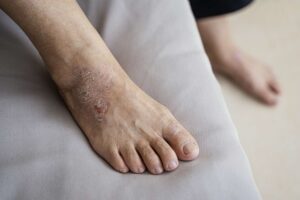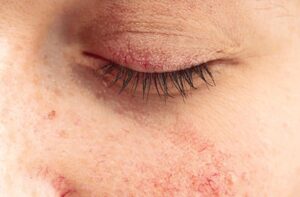Last updated on September 26th, 2024 at 11:15 am
Eczema treatment encompasses a diverse array of approaches aimed at managing the symptoms of this chronic skin condition. Eczema, also known as atopic dermatitis, is a skin condition that affects millions of people worldwide. Characterized by redness, itching, and inflammation, eczema can be uncomfortable and, at times, debilitating.
While there is no cure for eczema, there are numerous eczema treatment options available to help manage symptoms and improve the quality of life for those living with this condition.
Eczema Symptoms
Eczema is a multifactorial condition influenced by genetics, immune system dysfunction, and environmental triggers. Common symptoms include:
- Itchy, red, and inflamed skin
- Dry, sensitive skin
- Rash or blisters
- Cracked or scaly skin
- Oozing or weeping sores
Eczema can occur at any age, but it often develops in childhood and may persist into adulthood. Flare-ups can be triggered by various factors such as stress, allergens, irritants, climate, and even certain foods. Eczema treatment and management strategies aim to reduce symptoms, prevent flare-ups, and improve the overall quality of life.
Read: What are Generic Medicines?
Conventional Eczema Treatment
The best treatments for conventional eczema are mentioned below:
- Topical Steroids: These are the most common treatment for eczema. Topical corticosteroids reduce inflammation and relieve itching. They are available in different strengths, and your dermatologist will prescribe the appropriate one for your condition.
- Moisturizers: Keeping the skin hydrated is essential. Apply fragrance-free, hypoallergenic moisturizers regularly, especially after bathing, to prevent dryness and itching.
- Topical Calcineurin Inhibitors: These non-steroidal creams, such as tacrolimus and pimecrolimus, are used for mild to moderate eczema. They work by suppressing the immune response in the skin.
- Oral Medications: In severe cases, oral medications like antihistamines (to relieve itching) or immunosuppressants (like cyclosporine) may be prescribed.
- Phototherapy: Controlled exposure to UVB light can help manage eczema symptoms. It is typically done under medical supervision.

Holistic Approaches
While conventional eczema treatments are effective, some people seek holistic or complementary therapies to manage eczema. It’s essential to consult with a healthcare professional before trying these approaches, as they may not be suitable for everyone. Some holistic options include:
- Probiotics: Some studies suggest that probiotics can help balance the gut microbiome and potentially reduce eczema symptoms.
- Dietary Changes: Identifying and eliminating trigger foods can be beneficial for some individuals. Typical triggers contain dairy, gluten, and certain nuts.
- Natural Remedies: Aloe vera, coconut oil, and chamomile can provide relief for some people. However, it’s essential to test these remedies on a small patch of skin to ensure they do not worsen the condition.
- Stress Management: Stress can trigger eczema flare-ups. Techniques like yoga, meditation, and deep breathing exercises may help reduce stress and improve skin health.
- Wet Wrap Therapy: This involves applying moisturizer or medication to the skin, followed by wrapping the affected area in damp bandages or clothing. It can provide significant relief during flare-ups.
> Consult a doctor and Order Medicine Online
Eczema on Face Treatment
Eczema on the face can be particularly distressing, as it not only affects your skin’s appearance but can also lead to discomfort and self-consciousness. Facial eczema, like eczema elsewhere on the body, is characterized by redness, itching, and inflammation. However, eczema on the face treatment requires extra care and attention due to the sensitivity of this area. The Face Treatments for Eczema are mentioned below:
- Topical Steroids: Topical corticosteroid creams or ointments are often prescribed to reduce inflammation and itching. However, these should be used sparingly on the face, as the skin is thinner and more sensitive in this area.
- Non-Steroidal Topical Medications: For milder cases of facial eczema, non-steroidal creams like tacrolimus and pimecrolimus can be effective in reducing inflammation without the side effects associated with steroids.
- Emollients and Moisturizers: Keeping the skin well-hydrated is crucial in managing facial eczema. Use fragrance-free, hypoallergenic moisturizers specifically designed for sensitive skin. Apply moisturizer to the face multiple times a day, especially after washing.
- Avoid Irritants: Identify and avoid skincare products that contain fragrances, dyes, alcohol, or other potential irritants. Use gentle, soap-free cleansers designed for sensitive skin.
- Warm Compresses: Applying a warm, damp cloth to the affected area can help soothe itching and reduce inflammation. Ensure the cloth is not too hot, as excessive heat can worsen eczema.
- Oral Antihistamines: Over-the-counter or prescription antihistamines can help alleviate itching and discomfort. Before using any medication consult with a healthcare professional.
- Sun Protection: Protect your face from the sun’s harmful UV rays by wearing a wide-brimmed hat and applying a broad-spectrum sunscreen with SPF 30 or higher. Sunburn can exacerbate eczema symptoms.
- Avoid Hot Water: Hot water can strip the skin of its natural oils and exacerbate eczema. Use lukewarm water for washing your face and pat it dry gently with a soft towel.
- Prescription Medications: In severe cases, a dermatologist may prescribe oral medications or recommend phototherapy (light therapy) to manage facial eczema.

Eyelid Eczema Treatment
Eczema on the eyelids, often referred to as eyelid dermatitis, can be particularly uncomfortable and challenging to manage due to the delicate nature of the skin around the eyes. Factors like allergens, irritants, or even eye makeup can trigger flare-ups. Let’s explore the specific treatment of eyelid eczema:
- Avoid Eye Makeup: While experiencing an eyelid eczema flare-up, avoid using eye makeup products, as they can worsen irritation. Choose hypoallergenic, fragrance-free alternatives when you do use makeup.
- Cool Compresses: Applying a cool, damp cloth to the affected eyelids can help reduce itching and inflammation.
Conclusion:
Eczema is a challenging condition to manage, but with the right treatment plan and lifestyle adjustments, you can find relief and improve your skin’s health. Consult with a dermatologist or healthcare professional to create a personalized treatment strategy that works for you. Remember that managing eczema is an ongoing process, and with patience and persistence, you can lead a more comfortable and itch-free life.
FAQs on Eczema Treatment
Q.1 What is Eczema Treatment?
Eczema treatment typically involves the use of topical corticosteroid creams or ointments to reduce inflammation and itching, along with moisturizers, skincare adjustments, and, in some cases, non-steroidal medications.
Q.2 What’s the best approach for eczema on the face treatment?
The treatment for eczema on the face typically involves gentle skincare, non-steroidal creams like tacrolimus, and avoiding irritants like fragrances in cosmetics.
Q.3 How can I manage eyelid eczema effectively?
Eyelid eczema treatment often includes cool compresses, avoiding eye makeup during flare-ups, and, in severe cases, under the guidance of a dermatologist, low-potency topical steroids for short-term use.
Related Links:
